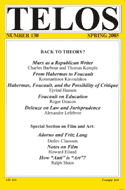As an occasional feature on TELOSscope, we highlight a past Telos article whose critical insights continue to illuminate our thinking and challenge our assumptions. Today, Charles Kollmer looks at Alexandre Lefebvre’s “A New Image of Law: Deleuze and Jurisprudence,” from Telos 130 (Spring 2005).
 Even readers with a cursory familiarity with Gilles Deleuze’s work will have no trouble surmising his critical attitude toward the law. As an abstracting and generalizing social force, law seems to stand in stark opposition to watchwords like immanence and singularity that pervade Deleuze’s texts. In “A New Image of Law: Deleuze and Jurisprudence,” Alexandre Lefebvre offers a novel interpretation of this antagonism toward the law, starting by distinguishing between law and jurisprudence. As the philosophy that informs the practice of law, jurisprudence interrupts the stasis of the legal code by actively applying it to a case. In turn, a given case takes on a genetic role in future versions of the law (conventionally referred to as precedent). Jurisprudence liberates law from appeals to transcendent values by insisting on its relevance to the here-and-now, as well as its role in the genesis of the yet-to-come. In his article, Lefebvre elaborates on this dynamic, starting with a summary of Deleuzian critiques of law, then moving toward what he terms “a new image of law,” drawing on Henri Bergson’s metaphysics in the process.
Even readers with a cursory familiarity with Gilles Deleuze’s work will have no trouble surmising his critical attitude toward the law. As an abstracting and generalizing social force, law seems to stand in stark opposition to watchwords like immanence and singularity that pervade Deleuze’s texts. In “A New Image of Law: Deleuze and Jurisprudence,” Alexandre Lefebvre offers a novel interpretation of this antagonism toward the law, starting by distinguishing between law and jurisprudence. As the philosophy that informs the practice of law, jurisprudence interrupts the stasis of the legal code by actively applying it to a case. In turn, a given case takes on a genetic role in future versions of the law (conventionally referred to as precedent). Jurisprudence liberates law from appeals to transcendent values by insisting on its relevance to the here-and-now, as well as its role in the genesis of the yet-to-come. In his article, Lefebvre elaborates on this dynamic, starting with a summary of Deleuzian critiques of law, then moving toward what he terms “a new image of law,” drawing on Henri Bergson’s metaphysics in the process.







